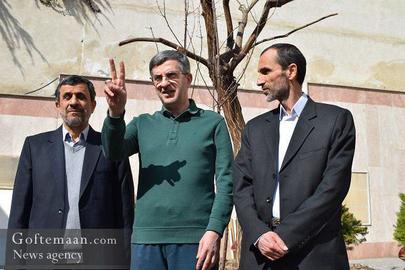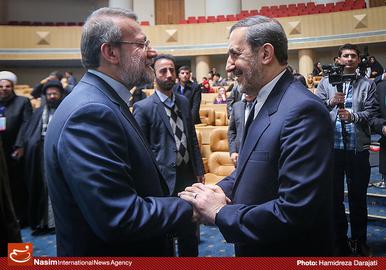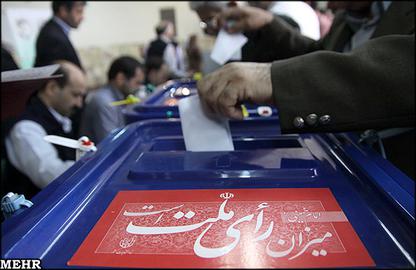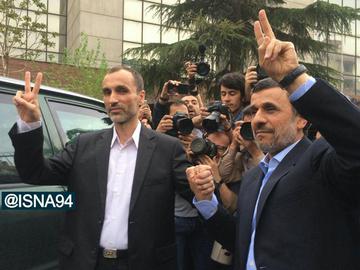With less than 40 days to go before Iran’s presidential and local councils elections, various political currents in the country have begun organizing their forces. Because the Islamic Republic does not officially recognize political parties, these politicians face a hard task. Yet the tribal structure of Iranian politics has accommodated itself to this peculiarity, making the run-up to election day on May 19 a fascinating — if sometimes baffling — process.
In the campaign for the 2017 presidential election, eight political factions stand out, and will likely make their mark on the election.
1. Moderates
The Moderation and Development Party, the godfather of which is President Hassan Rouhani, is the core political organization of the moderates. The party’s key figures are the Minister of Communication, Mahmoud Vaezi, Rouhani’s Vice President for Planning, Mohammad Bagher Nobakht, the former Minister of Culture and Islamic Guidance, Ali Jannati, the Deputy Head of Presidential Administration, Morteza Bank, and Akbar Torkan, senior advisor to Rouhani.
Ali Jannati is currently the head of the Moderation and Development Party’s election headquarters and Morteza Bank runs Rouhani’s campaign headquarters for the provinces.
To bolster its chances in the forthcoming elections, the party has selected two figures close to reformists for prominent roles: Former Science Minister Mohammad-Ali Najafi heads its Policy Council and Vice President for Executive Affairs Mohammad Shariatmadari is guiding its campaign.
Behind the scenes is Rouhani’s Chief of Staff, Mohammad Nahavandian, who is the moderates’ link to the country’s conservative principlists. Hesamodin Ashna, Rouhani’s advisor in cultural affairs, is known for his talent for propaganda.
One key figure missing from the current framework is Rouhani’s brother and close confidant Hossein Fereydoon. Fereydoon has been kept on the sidelines after a group of parliamentarians and members of the Revolutionary Guards accused him of financial corruption, but Rouhani’s opponents will make sure his name is not forgotten during the campaign.
This coalition generally believes that Rouhani is their candidate and there is no need for “backup” candidates to cover unforeseen developments — for example, if the Guardian Council disqualifies Rouhani from running again.
2. The Reformists’ Policy-Making Council (RPMC)
This organization is under the total control of former reformist president Mohammad Khatami. Mohammad Reza Aref, leader of the reformist parliamentary faction Omid (“Hope”), and first vice president under Khatami, runs the council’s executive affairs. The influence of Ayatollah Khomeini’s grandson Hassan Khomeini is evident at the council’s headquarters.
The core of this coalition is the Executives of Construction Party, which has close relations with many members of Rouhani’s cabinet. Eshaq Jahangiri, Rouhani’s first vice president, who was Minister of Industries and Mines under Khatami, is head of the party’s central council.
The RPMC mostly revolves around individual figures and the coalition has almost no room for other reformist parties. For this reason, some reformists are dissatisfied with the council and believe that the Reformist Front Coordination Council, an umbrella organization for reformist parties, should spearhead the election campaign. Those supporting the organization have tried to create a parallel front, but considering the dominance of the RPMC’s senior figures, their objections have not been a serious obstacle. This is especially due to the fact that the Association of Combatant Clerics, the most important reformist grouping, will follow the decisions of the RPMC in the 2017 election. And besides Khatami, Abdolvahed Mousavi Lari, a leading member of the Association of Combatant Clerics, is a RPMC member.
Reformists in general support Hassan Rouhani. But many of them insist that they need “backup” candidates to help Rouhani in the debates. After the debates, these candidates will retire from the race. Within the next couple of days, President Rouhani will make it clear whether he supports this approach or not.
3. The Popular Front of Islamic Revolution Forces (PFIRF)
PFIRF is similar to the Reformists’ Policy-Making Council, but on the conservative side. Its head is the cleric Mohammad Hasan Rahimian, but former Speaker of Parliament Gholam Ali Haddad-Adel mostly controls the group's operations.
The PFIRF was set up only a few months ago. Since then, it has held two rounds of internal elections to choose its final presidential candidate and has succeeded in bringing almost 50 percent of the principlists under its umbrella. These include the Progress and Justice Society of Islamic Iran, which is associated with Tehran’s mayor Mohammad Bagher Ghalibaf; the Resistance Front of Islamic Iran, which supports Mohsen Rezaee, a former Revolutionary Guards general and the current secretary of the Expediency Council; the Society of Devotees of the Islamic Revolution, led by the parliamentarian Hossein Fadaei; the Society of Path Seekers of the Islamic Revolution, led by the former MP Alireza Zakani; and YEKTA Front (the Front of Comrades for the Effectiveness and Transformation of Islamic Iran), led by Hamid-Reza Haji Babaee, who was Minister of Education under Ahmadinejad. The PFIRF has also won the support of the conservative Combatant Clergy Association (not to be confused with the reformist Association of Combatant Clerics), led by Tehran’s Provisional Friday Prayers Leader Ayatollah Muhammad Ali Movahedi-Kerman.
There is also a strong possibility that the Society of Seminary Teachers of Qom, another important principlist association led by Mohammad Yazdi, the former judiciary chief and current chairman of the Assembly of Experts, will support the front’s presidential candidate.
Two other principlist groups that for the moment have moved under the PFIRF ‘s umbrella are the Islamic Coalition Party, which has named former Minister of Culture Mostafa Agha Mirsalim as its presidential candidate, and the Islamic Society of Engineers. Neither group is particularly influential.
The front has also supporters from among principlist members of parliament. Ebrahim Raeesi is its most likely candidate. Raeesi has announced that he will run as an independent, but in the end it will make no difference because the PFIRF will most likely support him regardless. The same, of course, could be true for Tehran mayor Mohammad Bagher Ghalibaf. In fact, the PFIRF is playing the role of a good logistics officer for the principlists.
4. The Front of Islamic Revolution Stability
This extreme fundamentalist group is led by the hardline cleric Morteza Agha-Tehrani, who was known as Ahmadinejad's moral advisor. The group’s main figure behind the scenes is Sadegh Mahsouli, who was a cabinet minister under Ahmadinejad. But its actual leader and spiritual father is Ayatollah Mohammad Taghi Mesbah Yazdi, who has been described as "a theoretician of Iranian radicals.” Their favored candidates are Saeed Jalili, the chief nuclear negotiator under Ahmadinejad, and Ebrahim Raeesi. Raeesi provides the front and PFIRF with a common ground, offering an important focal point for principalists.
5. The Ahmadinejad Group
Mahmoud Ahmadinejad, who registered his own candidacy on April 12, and his two associates Esfandiar Rahim Mashaei and Hamid Reza Baghaei are trying to use the upcoming election to ignite a new political current in Iran. However, their efforts face stiff opposition from the principlists. Even Gholam-Hossein Elham, Ahmadinejad’s former chief of staff and one-time staunch supporter of the former president, has refused to support the initiative.
At the moment, this group lacks any political organization and uses the internet and social networks to push its ideas and agendas (in March, Ahmadinejad joined Twitter.) Their ideal candidate is Ahmadinejad himself, but Ahmadinejad has voiced his support for Hamid Reza Baghaei, his former vice president.
6. Moderate Principlists
Former Speaker of Parliament Ali Akbar Nategh Nouri, current Speaker of Parliament Ali Larijani and former Foreign Minister Ali Akbar Velayati are the three rather silent leaders of Iran’s group of moderate principlists. In the past, Nouri and Larijani have supported Hassan Rouhani, but until now Velayati has expressed no preference. The three might be mostly silent, but they are potentially very influential. Less silent is the outspoken MP Ali Motahari, who is also a moderate principlist. He supports Hassan Rouhani.
7. Saeed Jalili Associates
A limited number of hardliner principlists who have chosen not to work with the umbrella group the Popular Front of Islamic Revolution Forces and have expressed displeasure with the Combatant Clergy Association have lined up behind Saeed Jalili, former nuclear negotiator under Mahmoud Ahmadinejad. These principlists do not control any political organization and primarily go online to promote their agenda. A candidate in the 2013 presidential elections, Jalili received more than four million votes. The prospects of this outcome being repeated has alarmed some principlists, who want to dissuade him from running and directing votes away from the candidates they support, such as former Revolutionary Guards general and current secretary of the Expediency Council, Mohsen Rezaee.
8. The Revolutionary Guards
By law, the military is banned from interference in Iranian elections. However, this has not stopped the Revolutionary Guards from becoming involved. The Guards recently set up a charitable foundation together with Rouhani key rival Ebrahim Raeesi, and its associated news agencies Fars and Tasnim have been heavily promoting Raeesi and the Popular Front of Islamic Revolution Forces.
In recent weeks, the Intelligence Unit of the Revolutionary Guards has been busy arresting pro-Rouhani journalists in a bid to silence them in anticipation of the election campaign. This is at least as important as the Guards’ support for Raeesi — and possibly more so. The damage it might cause to Rouhani’s bid for re-election is substantial.
visit the accountability section
In this section of Iran Wire, you can contact the officials and launch your campaign for various problems



























comments